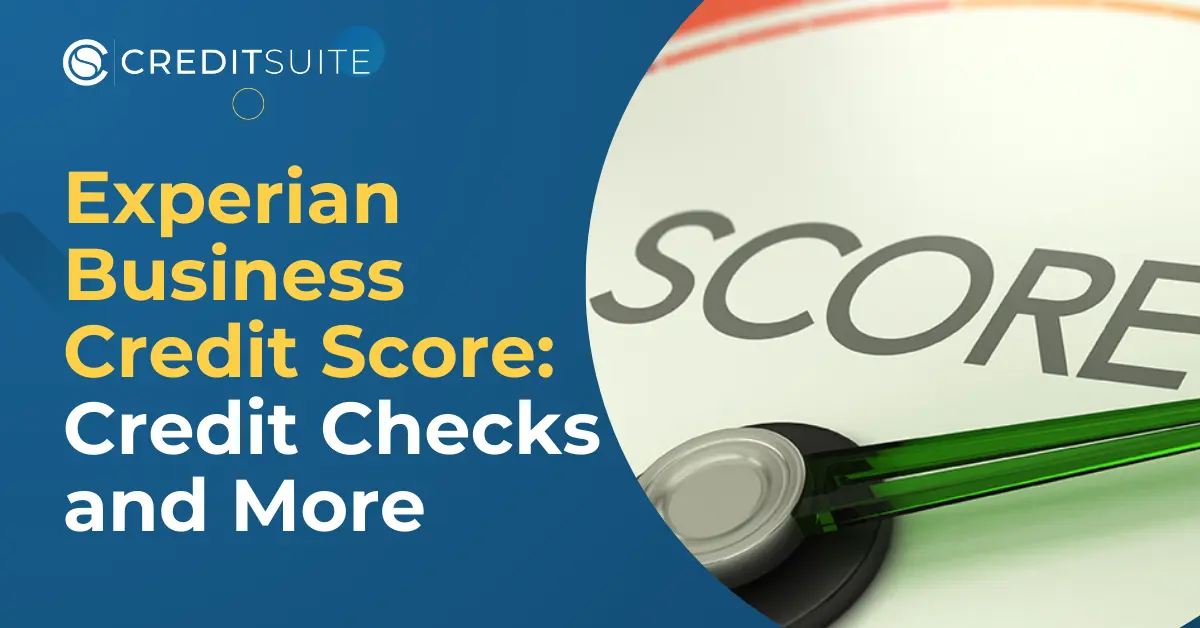Experian is one of three major credit reporting agencies. Equifax and Dun & Bradstreet round out the bunch. It’s easy to see why your business credit score with Experian is important when you consider they keep files of 99.9% of American companies.
What You Need to Know About Your Experian Business Credit Score
Your business credit score is important regardless of which credit reporting agency it comes from. It’s also important that you understand what your business credit score is saying to lenders. Beyond that, you cannot truly function well as a business if you don’t understand what makes up your score. In light of that, here is what you need to know as relates to your business credit score, Experian especially.
Business Credit Score Experian: Getting Started
According to Experian, all their information comes from third parties. Businesses cannot add any information to their company credit profile.
However, you need to have your business set up properly. Failing to do so means those third parties will not recognize your company as a business. It is vital to establish your business as a separate entity from yourself. If you don’t, your business transactions will get mixed up with personal transactions. Not only that, but they may show up on your personal credit report. That is not a good thing.
Here is what you need to start separating your business from yourself.
- EIN
- Separate contact information
- A dedicated business bank account
- Also, you have to formally incorporate
Business Credit Score Experian: What you Need to Know About Intelliscore
With Experian, the main business credit score and report is the Intelliscore Plus. It contains the following.
Business Information
First, there is the standard business identifying information. That is your business name and address. In addition, ownership data is included. Important personnel and the type of company you have will also be there.
Furthermore, time in business, number of employees, and the amount of yearly sales are all on this report.
Payment Information
Then, you can see delinquent payments. This includes how many days late they are. Lenders can also see an overall trend. For example, the lowest and highest balance for the past six months. Current balance is also shown. By showing the credit limit available to your business, the report gives an idea of the credit utilization rate for your company.
The number of tradelines your business has is here as well. Also, you will see how many times a company has checked your credit and any UCC filings.
There is a comparison of businesses doing worse than yours too. In addition, the number of bankruptcies, liens, and judgments are in this section.
Summary of Credit
The credit summary shows the Experian business credit score. Also, it links to information on what goes into the score and tips on the best ways to improve it.
Payment Summary
After that, you see the payment summary. There are visuals for trends by the month and quarter.
Next, there are bar charts showing payment trends for the past 6 months. This is as reported from the tradelines.
Trade Payment Information
Then, there is a section about how your business has done with its payments. This is broken down by type of account.
Inquiries
Next up are inquiries. These are companies that have pulled your small business’s credit. The list includes the names of companies making inquiries and the month the inquiry was made.
Collection Filings
For the next section, any collection filings are on the report by date. It includes collection agency name, status, amounts, and the close date, if appropriate.
Collections Summary
This is self-explanatory. It is a summary of collections, and it is just below the collection filings portion.
Commercial Banking, Insurance, Leasing
In this section, Experian lists all the information it has on your business relationships. For example, this includes relationships with insurance, commercial banking, and leasing companies. Specifically, how much credit was extended? When did the loan start? It also includes any remaining balance.
Judgment Filings
Next is the report on legal information. It includes the court where a judgment was filed, the date, and how much it was for.
Tax Lien Filings
Tax lien filing information is similar to judgment filings. The only difference is there is a listing for a filing location instead of court.
UCC Filings
You guessed it. Here you will find information related to UCC filings:
- Date
- filing number
- jurisdiction
- name of the secured party
- activity on the filing.
UCC Filings Summary
Under that, is the UCC filings summary. It is broken down by filing period and type of filing.
Owner Profile
There is also an entrepreneur profile for smaller companies. The purpose of this is to show relationships between you and your business. It automatically links the credit history of business owners to their business credit report.
That means, it is much easier for your creditors to access your personal credit. They may use it in determining your creditworthiness as a whole. So, even when you do the work to establish separate business credit, your personal credit can still be taken in to account.
Business Credit Score Experian: Intelliscore
The Intelliscore is a credit-risk evaluation. It’s based on statistics. The goal is to help businesses, investors, and potential lenders make decisions about creditworthiness.
It’s similar to how lenders use your personal credit score. Before they decide to lend you money, they check your credit score. The Intelliscore Plus can provide an idea of the credit risk associated with a specific business.
Intelliscore Plus Credit Score Range
Your business credit score with Experian ranges from 1 to 100. A higher score indicates a lower risk. In contrast, the lower your score, the higher risk.
How Is A Business Credit Score Experian Calculated?
One reason Intelliscore is so good at calculated risk is that they identify key factors that show how likely a business is to pay their debt.
There are over 800 of these factors. However, they can all fit into the following general categories.
Payment History
Of course, this is how well you are making payments. The information includes the number of times your accounts have been late. It also shows the percent of accounts that are currently late. Your overall balance in accounts is listed too.
Frequency
This refers to the how many times your accounts have been sent to collections. In addition, you will see the number of liens and judgments you may have. Any bankruptcies related to your business or personal accounts also show up here.
In addition, frequency has to do with your payment patterns. Were you regularly slow or late with payment? Did you start off paying bills late but get better over time?
Financial
This focuses on how you use credit. Like, how much of your credit is currently in use? Do you have a high ratio of delinquent balances in relation to your credit limits?
If your business is not yet in operation or you do not have a long history of business transactions, how will they rate you?
This is where Experian uses a blended model. They consider your personal consumer credit score with your business’s credit score.
Other Business Credit Score Experian Reports
There are a number of other products as well. These reports are designed to help you as the owner monitor your business credit. Prices can change without notice so check with Experian directly to ensure the most current pricing.
Business Credit Advantage Plan
This one contains mobile-friendly alerts and tips for improving your score.
Profile Plus Report
This report features financial payment data. It also predicts payment behavior.
Credit Score Report
This report is the least comprehensive. Basically, it includes business and credit information. Also, there is a summary of financial payment data.
Valuation Report
This report shows the value of your company. It also contains Key Performance Indicators. Additionally, it shows your business’s fair market value.
Corporate Profiles
Experian also furnishes premium corporate profiles at an additional cost. The enhanced profiles contain even more detail including:
- Sales figures
- size
- contact details
- products and operations
- credit summary
- any Uniform Commercial Code (UCC) filings
- fake business names
- payment and collections history
These are above and beyond the information in the basic corporate profiles. They also have data on credit inquiries made in the past nine months.
Business Credit Experian Credit Alerts
You can subscribe to business credit alerts through Experian’s Business Credit Advantage program. It serves as a self-monitoring service. The program allows unlimited access to your business’s business credit report and score. You can make use of this tool for handling your business credit. Alerts are sent for:
- Company address changes
- Changes in your business credit score
- Credit inquiries on your business profile
- Newly-opened credit tradelines
- Any USS filings
- Collection filings and
- Any public record filings, for example, liens, bankruptcies, and judgments
There are ways to monitor your Experian business credit score for a fraction of the cost. Research is important.
How Do You Improve Your Business Credit Score with Experian?
Thankfully, there are a few things you can do to make your Experian business credit score better. If it isn’t great already that is. It takes time, but it is possible.
Make Consistent, On-Time Payments
Paying your bills on time will help establish your small business as one that pays its debts. This will eventually help push your score up. As a result, lenders will view your business as low risk.
Actually Use the Credit
You should definitely keep your debt low. However, opening business credit accounts can help raise your credit score. Use all credit responsibly.
Maintain Healthy Personal Credit
At this point, you realize that your personal credit is not out of the picture. It can affect your Experian business credit score. You have to stay on top of your personal debt.
Business Credit Score, Experian or Otherwise, Is Vital to Fundability
Your credit score from any of the business credit reporting agencies is important. You never know which one a lender may use.
Yet, credit score isn’t the only piece that matters. Business credit scores are just one part. Overall business Fundability includes much more. Fundability as a whole is much more involved than just business credit. There is a bigger picture.


